
|
Astronomy Picture Of the Day (APOD)
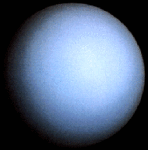 Uranus: The Tilted Planet
Uranus: The Tilted Planet
16.08.1995
This picture was snapped by the Voyager 2 spacecraft in 1986 - the only spacecraft ever to visit Uranus. Uranus is the third largest planet after Jupiter and Saturn. Uranus has many moons and a ring system.
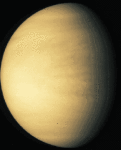 Venus: Earth's Sister Planet
Venus: Earth's Sister Planet
15.08.1995
This picture in visible light was taken by the Galileo spacecraft. Venus is very similar to Earth in size and mass - and so is sometimes referred to as Earth's sister planet - but Venus has a quite different climate.
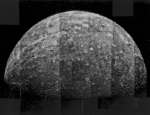 Mercury: Closest Planet to the Sun
Mercury: Closest Planet to the Sun
14.08.1995
This picture was compiled from images taken by the NASA spacecraft Mariner 10 which flew by the planet three times in 1974. Mercury is the closest planet to the Sun, the second hottest planet (Venus gets hotter), and the second smallest planet (Pluto is smaller).
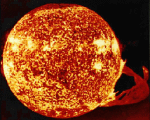 The Sun Erupts
The Sun Erupts
13.08.1995
The sun was captured in 1973 throwing one of the largest eruptive prominences ever recorded. Sol, our sun, is a normal star. It formed about 5 billion years ago, and will last about another 5 billion years. The sun will never explode, and a solar flare will never destroy the earth.
 Atlantis Landing
Atlantis Landing
12.08.1995
Space Shuttle Atlantis lands at Edwards Air Force Base in California. The Space Shuttle is the first orbital space vehicle to land on a runway like an airplane. Space Shuttles sometimes have the option of landing in White Sands, New Mexico or at the Shuttle Landing Facility at the Kennedy Space Center in Florida.
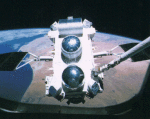 The Compton Gamma Ray Observatory
The Compton Gamma Ray Observatory
11.08.1995
The Compton Gamma Ray Observatory (CGRO) was the most massive instrument ever launched by a NASA Space Shuttle and continues to revolutionize gamma-ray astronomy. This orbiting observatory sees the sky in gamma-ray photons - light so blue humans can't see it.
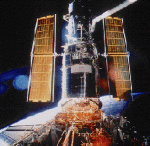 The Orbiting Hubble Space Telescope
The Orbiting Hubble Space Telescope
10.08.1995
The Hubble Space Telescope (HST) is the largest orbiting public optical telescope in history. Its 2.4 meter diameter reflecting mirror and its perch above Earth's atmosphere allow it to create exceptionally sharp images.
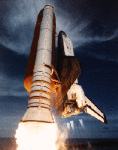 Challenger Launches Spacelab 2
Challenger Launches Spacelab 2
9.08.1995
Space Shuttle Challenger jumps off the launch pad in 1985 to begin a successful mission. The main purpose of this mission was to test a new space based laboratory named Spacelab 2. Spacelab...
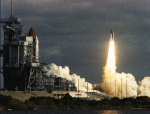 Columbia Waits, Discovery Launches
Columbia Waits, Discovery Launches
8.08.1995
Space Shuttle Discovery launches while the Space Shuttle Columbia is readied for a future mission. Space shuttles are launched from the Kennedy Space Center in Florida. At this date there are four operating space shuttles: Atlantis, Columbia, Discovery, and Endeavour. This mission is most famous for carrying the Hubble Space Telescope into orbit.
 Night Launch of Endeavour
Night Launch of Endeavour
7.08.1995
Space Shuttle Endeavour thunders off into orbit in a rare night launch. This March 1995 mission is most famous for operating the set of astronomical telescopes known as Astro-2. Astro-2's telescopes observed the universe in ultraviolet light - light so blue humans by themselves can't see it.
|
January February March April May June July August September October November December |
||||||||||||||||||||||||||||||||||||||||||||||||||||||||